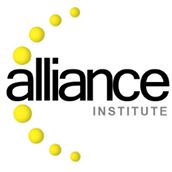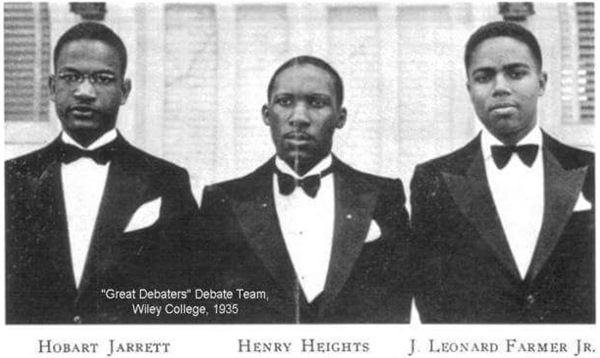The Roots of Alliance Institute
 Tuesday, March 8, 2016 at 5:15AM
Tuesday, March 8, 2016 at 5:15AM Marcus Garvey, the leader of the largest movement of Blacks in modern history, is often quoted as saying “A people without the knowledge of their past history, origin and culture is like a tree without roots.” Similarly, in this work of social justice, we often find that too few truly understand their organizing lineage and from whence they (and their work) come. As someone who regularly trains and mentors community organizers, I find it invaluable to provide historical context to the work they are doing in these modern times. This type of information not only helps to “place” the work in time and place, but to remind folks that the work is ongoing and that our job is to help carry the bucket forward.
Marcus Garvey, the leader of the largest movement of Blacks in modern history, is often quoted as saying “A people without the knowledge of their past history, origin and culture is like a tree without roots.” Similarly, in this work of social justice, we often find that too few truly understand their organizing lineage and from whence they (and their work) come. As someone who regularly trains and mentors community organizers, I find it invaluable to provide historical context to the work they are doing in these modern times. This type of information not only helps to “place” the work in time and place, but to remind folks that the work is ongoing and that our job is to help carry the bucket forward.
To that end, I’d like to take some time to share the roots of Alliance Institute, so that there might be a better understanding of why we do what we do, in the way that we do. And because this organizing tree has many branches (as you will soon see), perhaps there will also be a greater understanding of social justice organizing across many other organizations and movements.
James Farmer, Jr. is a little known, but remarkable contributor to modern community organizing. He is most well known as the teenage prodigy in the movie “The Great Debaters” starring Denzel Washington. Although mentioned at the very end of the movie, Farmer should be known as the founder CORE (Congress of Racial Equality). CORE, although less well known than the Student Nonviolent Coordinating Committee or the Southern Christian Leadership Council, was central to the success of the Civil Rights Movement. Most notably, CORE organized the interracial Freedom Rides, which helped to expose the deep hatred of Southern Whites towards the idea of Blacks having rights “that a White Man was bound to respect” (thanks to Supreme Court Chief Justice, Roger Taney – 1967). In addition, CORE was key in organizing the March on Washington and Freedom Summer.
Dr. George Wiley, Phd. while teaching at University of California Berkeley in 1960, started the Syracuse chapter of CORE where he furthered the organizing training he received working with James Farmer. Six years later, Dr. Wiley co-founded the Poverty Rights Action Center which sought to coordinate efforts of poor people’s organizations. In line with this they participated in the Cesar Chavez’s United Farm Workers Organizing Committee to coordinate poverty rights demonstrations across 16 cities on June 30, 1966.
With thousands of low-income families participating in the June 30 demonstrations, thus began the process of establishing a new organization to further the movement. In August 1967 delegates from 67 organizations came together and formed the National Welfare Rights Organization (NWRO). NRWO utilized direct action organizing as a key strategy, moving thousands of welfare recipients to fight for change. In addition to lifting the plight of the low-income to the national level, NWRO focused locally for additional funding to families with school aged children for clothing, and retail credit for NWRO members. At its height the organization had 20,000 dues paying members, 540 individual chapters, and an impact on some 75,000 families.
It should also be noted that following Dr. Wiley’s resignation, NWRO put forth that Welfare is a Woman’s, a issuemajor step in recognizing the significant impact of poverty on women.
While at NWRO, Dr. Wiley sent two organizers into Arkansas to test a new model of multi-issue organizing among low-moderate income families. Those two men were Gary Delgado & Wade Rathke. In 1970 they founded the Association of Community Organizations for Reform Now (ACORN). ACORN went on to become the bation’s largest community based organization for low- and moderate-families. At the time of its demise in 2010, the organization boasted over 100 offices, with nearly 500,000 dues paying members across the country. The organization, while focused heavily on local issues, bought together its membership for national campaigns that impacted first time homeownership, living wages, lead poisoning prevention, education, voter registration, Hurricane Katrina relief, and a host of other issues.
In 1980, Gary Delgado, who had left ACORN due to differences related to the racial dynamics of ACORN staff vs its membership, founded the Center for Third World Organizing (CTWO). CTWO has focused its efforts in line with Delgado’s concerns on training organizers of color. While its organizing efforts are not to be viewed in the same light as other organizations in this discussion, CTWO has been the primary source of non-white organizing professionals and organizations working on behalf of low- and moderate-income communities, primarily of color.
The impact of these two organizations today is inestimable, with their folks now leading, influencing, and/or advising most every progressive organization at the local, state, and national levels, including myself and Alliance Institute.
I do hope that this document serves to assist folks in better understanding this thing called social justice with a long view and a deep history. It is important to remember that there are other trees in this thing, such as the NAACP – SCLC- SNCC tree, as guided by Ella Baker. At the very least learn your roots so that you might stand stronger in the work.
A special thanks to the websites of the various organizations and Wikipedia for informing this historical journey.

